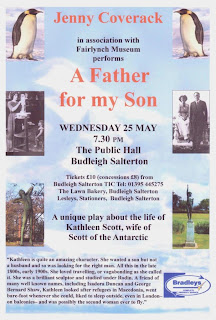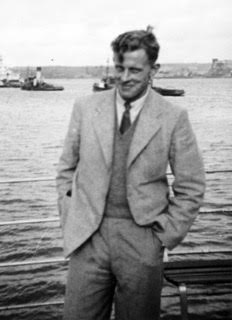"A woman who knew her own mind": interview with actress Jenny Coverack on her portrayal of Kathleen Scott

With the centenary of Scott of the Antarctic's ill-fated polar expedition very much in mind, a play with close links to Fairlynch Museum's 2011 exhibition 'Survival!' is coming to Budleigh Salterton's Public Hall on Wednesday 25 May.
I spoke to Jenny Coverack, the actress who will be performing it.
If you're a BBC Radio 4 listener you may well have heard her reading the Book at Bedtime 'Flush' by Virginia Woolf in February this year. More recently she was the midwife in 'The Archers.' Other BBC productions including 'Poetry Please' and 'The Afternoon Play' have also employed her acting talents.

Actress Jenny Coverack: "passionate" about playing the character of Kathleen Scott. She is pictured here performing part of her play 'A Father for my Son' in Scott's hut at Cape Evans, on Ross Island, Antarctica
Trained at the Bristol Old Vic, Jenny Coverack has a voice familiar to millions of radio listeners. She grew up in Cornwall, now lives in Devon, and is often to be seen performing on West Country stages. But her career as an actress has taken her to theatres all over Britain as well as overseas.

Kathleen Scott with her husband Robert, the Antarctic explorer.
Picture credit: Scott Polar Research Institute, University of Cambridge
That's been particularly the case with the play 'A Father for my Son', her one-woman show based on the life of Kathleen Scott (1878-1947), widow of Captain Robert Scott of Antarctic fame.
Scott died on 29 March 1912 with five companions on his way back from the South Pole, where he discovered that the Norwegian explorer Roald Amundsen had beaten him to it.
Where has the play been performed?
JC: The première was at Cotehele in the Tamar Valley, ten years ago in 2001. I've performed it in all kinds of venues from the Isles of Scilly to London, including The Yvonne Arnaud Theatre in Guildford, the Everyman in Cheltenham, the Theatre by the Lake in Keswick and the Royal Geographical Society in London.
One of the most memorable venues was on a cruise ship called the Kapitan Khlebnikov in the Antarctic. We were at 78 degrees 41'S, the furthest South that any professional play has ever been performed, as close as possible to Scott's hut. When I performed on the ship there was a standing ovation afterwards and the New Zealanders, the Australians and the Americans wanted me to take it to their countries!
How did you come to write the play?
JC: I saw a production of a play called 'Terra Nova' by the American playwright Ted Tally at the Theatre Royal Plymouth. It's based on the tragedy of Scott's expedition to the South Pole and I was so struck by the epic nature of the whole episode and the suffering of everyone involved, including Scott's wife Kathleen that I set about collaborating with Robert Edwards, a teacher in our local area. We based much of the play on Kathleen's diaries.
What's the play about?
JC: It lasts for 1 hour 30 minutes plus an interval. The first half tells Kathleen's story leading up to her meeting Scott, the birth of Peter Scott and the drama of Scott's fatal voyage to the South Pole, which is juxtaposed with what's happening to Kathleen. She eventually hears about Scott's death at sea in the Pacific, months later. The second act is about her life after Scott. The first act will stand on its own, although it's fascinating to see what happens to Kathleen after Scott's death.
Is it true that Kathleen had an affair with the Norwegian explorer Fridtjof Nansen while her husband was away?
JC: I think not. They were very good friends and there was mutual admiration but when Kathleen writes in her diary about possible future husbands, she dismisses Nansen as, "too old."

A talented sculptor, Kathleen had studied in Paris and been befriended by Rodin. This statue with its title 'Here I am. Send me!' taken from the Book of Isaiah is outside the chapel at Oundle School in Northamptonshire. As a pupil at the school in the 1920s, the future naturalist Sir Peter Scott had to endure the comments of those who assumed, wrongly, that Kathleen had used her son as a model
So what was her relationship with Scott? What kind of marriage was it?
JC: Kathleen is quite an amazing character. She wanted a son but not a husband and so was looking for the right man. All this was in the late 1800s and early 1900s.
George Bernard Shaw told her "No woman ever born had a narrower escape from being a man. My affection for you is the nearest I ever came to homosexuality." Yet she is supposed to have had plenty of male admirers. What made her so attractive to them do you think?
JC: A man ought to answer that question! But possibly because she was so unorthodox, she was a tom-boy, a free spirit and full of fun, always finding the positive in situations. Physically she was striking – Charles Shannon painted her many times.

This statue entitled 'Ad Astra' is located in Welwyn Garden City, Hertfordshire and was executed by Kathleen Scott in 1938
She was a friend of the dancer Isadora Duncan. Were they similar?
JC: They both loved dancing. Kathleen exulted in Isadora as an artist. Their friendship was probably based on idealism, that inherited money was limiting, adventure was true wealth and art and babies were the greatest achievements.
Do you admire her as one might admire the suffragettes?
JC: I am passionate about portraying a woman from that 'heroic era'. There is little or nothing mentioned about them at all and Kathleen is some woman! She was a free spirit and certainly knew her own mind.

The marble statue of Captain Scott in New Zealand, sculpted by Kathleen, was commissioned by Christchurch City Council following news of the explorer's death in March 1912
How involved have you felt with the character?
JC: Whenever I play any character I become involved with them. Kathleen has cast a bit of a spell over me – brought home recently when I was upset to hear that her statue of Scott in Christchurch, NZ was toppled in the recent earthquake. I was filmed, dressed as Kathleen, performing a snippet from the play, in the actual hut that Scott left from on his fatal journey. His bunk was close by. The bit I chose to do was actually talking to Scott - or Con as she called him. It was very moving. I felt I'd taken Kathleen back to Scott! Wayland Kennet - her son by her second marriage - came to see the inaugural performance and he said "Don't change it." He was 79 at the time.
So you've found it emotionally draining to perform. How have audiences responded?
JC: Well, I'm not related but I keep being told that I must be a reincarnation of her!
Tickets for 'A Father for my Son', being performed in the Public Hall on Wednesday 25 May at 7.30 pm are now available from Budleigh Salterton Tourist Information Centre (Tel: 01395 445275) Also from The Lawn Bakery, Budleigh Salterton and Lesleys, Stationers, Budleigh Salterton. Price £10. Concessions £8 The play lasts about 90 minutes, excluding an interval.


I am fascinated. 5 or 6 years behind the times. How can I see this play ? A Father for my Son ? Can you bring it to Wigtown Book festival ? Did you record it on utube? I am Kathleen's great niece.
ReplyDelete